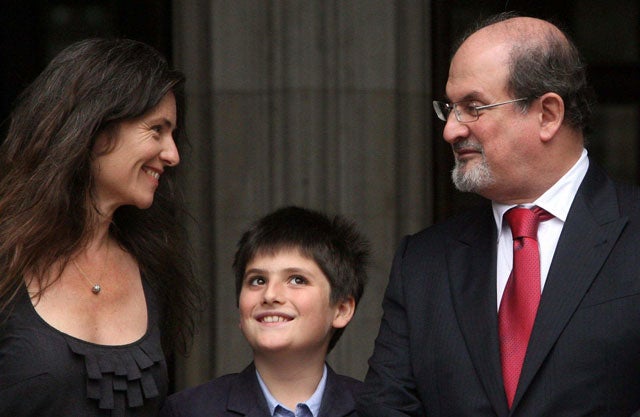Rushdie wins 'falsity' case against his former driver

Your support helps us to tell the story
From reproductive rights to climate change to Big Tech, The Independent is on the ground when the story is developing. Whether it's investigating the financials of Elon Musk's pro-Trump PAC or producing our latest documentary, 'The A Word', which shines a light on the American women fighting for reproductive rights, we know how important it is to parse out the facts from the messaging.
At such a critical moment in US history, we need reporters on the ground. Your donation allows us to keep sending journalists to speak to both sides of the story.
The Independent is trusted by Americans across the entire political spectrum. And unlike many other quality news outlets, we choose not to lock Americans out of our reporting and analysis with paywalls. We believe quality journalism should be available to everyone, paid for by those who can afford it.
Your support makes all the difference.Sir Salman Rushdie, the Booker Prize-winning author, received an apology in the High Court yesterday over false claims contained in a book about his time living under police protection.
Ron Evans, a former police officer and convicted fraudster who periodically worked as Sir Salman's driver when he was living under a fatwa, issued an apology through his solicitor over 11 counts of falsehood in his book On Her Majesty's Service, which has not yet been released.
The many false allegations about Sir Salman included suggestions that he was suicidal, unhygienic, and supervised by a police psychiatrist. The book also suggested that protection officers had an unprofessional and hostile relationship with the writer, and that Sir Salman charged his security men for alcohol they took from him.
One of the most damaging allegations suggested that Sir Salman, 61, was locked in a room by officers because of his objectionable attitude toward them.
Mr Justice Teare made a declaration of falsity against Mr Evans, his ghostwriter Douglas Thompson, and John Blake Publishing, the publisher behind the book.
After the hearing the Indian-born writer, who did not seek damages, said the court had shown that extravagant claims about his character in the book were "complete lies".
"This has been an unattractive affair", the author said. "My only interest was to establish the truth. I'm happy that the court has made its declaration of falsity and that the authors and publishers have recognised their falsehoods and apologised. As far as I'm concerned, that's the end of the matter".
The book, whose subtitle is My Incredible Life in the World's Most Dangerous Close Protection Squad, was due for publication on 4 August. John Blake Publishing, set up by the former tabloid journalist John Blake, has destroyed the first print run of 4,000 and is correcting two chapters. The publisher hopes to release a revised version later this week and has agreed, together with Mr Evans and Mr Thompson, to pay Sir Salman's legal costs, thought to be around £15,000.
Sir Salman only became aware of the book when highly damaging extracts were printed in the Mail on Sunday. The newspaper has agreed to publish an apology this week.
One of the 11 false allegations in the book suggested that Elizabeth West, who later became Sir Salman's third wife, originally only became his girlfriend because of the author's considerable wealth.
One of the results of the case was a rare joint public appearance by Sir Salman and Ms West, a publisher with whom he remains on good terms.
In 1997, the year they married, the couple co-edited The Vintage Book of Indian Writing 1947-1997. They had met in 1990, when the threat to Sir Salman's life was at its greatest, and he credited her with sustaining his spirits during a dark period. "She saved my life", he once said.
But in 1999 Sir Salman met a former model, Padma Lakshmi, and left Ms West for her amid a blaze of publicity. Sir Salman married Ms Lakshmi in 2004 and they divorced last year.
The book's false claims
The statements admitted to be false included:
* That Rushdie was locked in a room by officers because of his objectionable attitude towards them.
* That protection officers who asked Rushdie if they could buy alcohol from him were charged for the drinks.
* That safe houses were provided for Rushdie at government expense.
* That Rushdie sought to profit from the fatwa inviting Muslims to kill him for insulting the Prophet Mohamed.
* That the relationship between Rushdie and his protection teams was unprofessional, hostile and unfriendly.
* That Rushdie was unhygienic.
* That Rushdie was suicidal and was being supervised or examined by a police psychiatrist.
* That Elizabeth West became his girlfriend and then his wife because of Rushdie's wealth.
Subscribe to Independent Premium to bookmark this article
Want to bookmark your favourite articles and stories to read or reference later? Start your Independent Premium subscription today.
Join our commenting forum
Join thought-provoking conversations, follow other Independent readers and see their replies
Comments